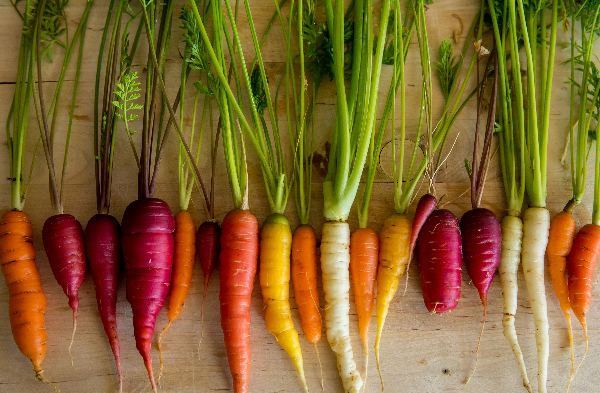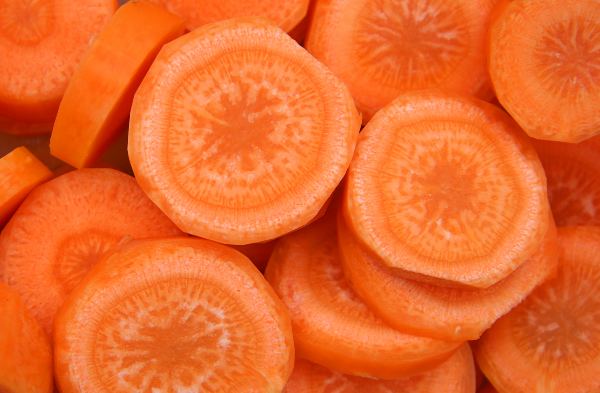An Introduction to Carrots

Highly versatile and widely recognised for their vibrant colours, carrots have been a staple in our diets for centuries and belong to the Apiaceae family of plants, the same as parsnips, coriander and celery.
Naturally hardy, these sturdy root vegetables can survive and thrive in a variety of climates, from the sweltering planes of Central Asia to the cooler allotments of Great Britain.
However, did you know that up until the 16th century, most carrots found in Europe were purple? During the 1700s, a group of patriotic Dutchmen decided to cultivate orange carrots in honour of William of Orange. This variety was so popular that nowadays, the orange carrot dominates supermarket shelves, with most of us completely forgetting it was ever any other colour!
Varieties of Carrot

There are a variety of different types of carrots that come in all shapes and colours, ranging from the familiar orange and purple carrots found in Europe, to red, yellow and white found in places such as Central Asia, Australia and the Middle East.
The four main types that are cultivated in the West are Chatenay carrots, Danvers carrots, Imperator carrots and Nantes carrots.
Of these four, the Imperator carrots are the most commercialised, boasting a slightly higher sugar content than the other varieties. Nantes carrots have a deliciously sweet flavour and are easy to grow, maturing quickly. They also have a more distinctive shape, being almost cylindrical at the tip and top.
Danvers carrots can come in a range of different colours and are considered to be highly versatile. Developed in Massachusetts in 1871, these carrots are generally skinnier than Imperator carrots but also slightly shorter and more adaptable to poor soil conditions.
Finally, there are Chatenay carrots, which are usually shorter and chunkier than the other carrots on this list and are usually used in processing due to their ability to store better than any other type.
Nutritional information

Carrots are chockfull of antioxidants, vitamins and minerals, with 122g containing 113% of your daily recommended intake of vitamin A!1 Due to its content of retinol, vitamin A is absolutely pivotal when it comes to promoting good eye health as well as healthy skin cells and proper immune function.
Carrots are also rich in biotin and vitamin K, the elusive ‘missing vitamin’ that plays a key role in clotting your blood. Add this to a respectable content of dietary fibre and potassium, and carrots soon turn into a powerhouse of nutrients!
1http://www.whfoods.com/genpage.php?tname=foodspice&dbid=21
Health benefits

You’ve probably heard the old wives tale of carrots helping you to see better in the dark. Originally this idea was spread during the Second World War, where RAF pilots claimed they were able to see better at night due to their consumption of the fantastically coloured vegetable.
Although there is no substantial evidence to back up this claim, there’s no denying that carrots are definitely outstanding for eye health. Our founder, renowned naturopath Alfred Vogel, recognised the value of carrots in this field, stating that the juice of carrots “improves eye-sight and stimulates the production of visual purple (rhodopsin), the lack of which causes night blindness.”
Rich in beta-carotene and retinol, a key component of vitamin A, as well as lutein, purple carrots in particular may have the edge over their orange counterparts, boasting approxima tely 28 times more anthocyanins! I’d personally recommend Biotta’s Purple Carrot Juice, which has also been lacto-fermented to help support the production of gut-friendly L+ lactic acid!
tely 28 times more anthocyanins! I’d personally recommend Biotta’s Purple Carrot Juice, which has also been lacto-fermented to help support the production of gut-friendly L+ lactic acid!
However, carrots aren’t just a one trick vegetable. According to a study conducted at the Wolfson Gastrointestinal Laboratory in Edinburgh, carrots may be capable of reducing your cholesterol, therefore preventing a major trigger of heart disease! Alfred Vogel also expanded upon the benefits of carrots when it comes to digestion, praising their ability to “stimulate blood circulation in the stomach and intestinal tissues,” thereby easing the symptoms of constipation and diarrhoea!
Last but definitely not least, carrots are considered to be outstanding for your skin and immune system. Research has even highlighted that certain nutrients found in carrots, such as beta-carotene and lycopene, may actually be able to help protect your skin from sun damage. Not to mention that the antioxidant properties of carrots make them very effective for combatting oxidative stress and moderating your immune function.
Carrot recipes
No Bake Carrot Cakes with Cashew Frosting
Carrot & Ginger Soup
Carrot & Mango Smoothie
Spiced Cauliflower & Carrot Salad





 Looking for our products in a store near you?
Looking for our products in a store near you?
